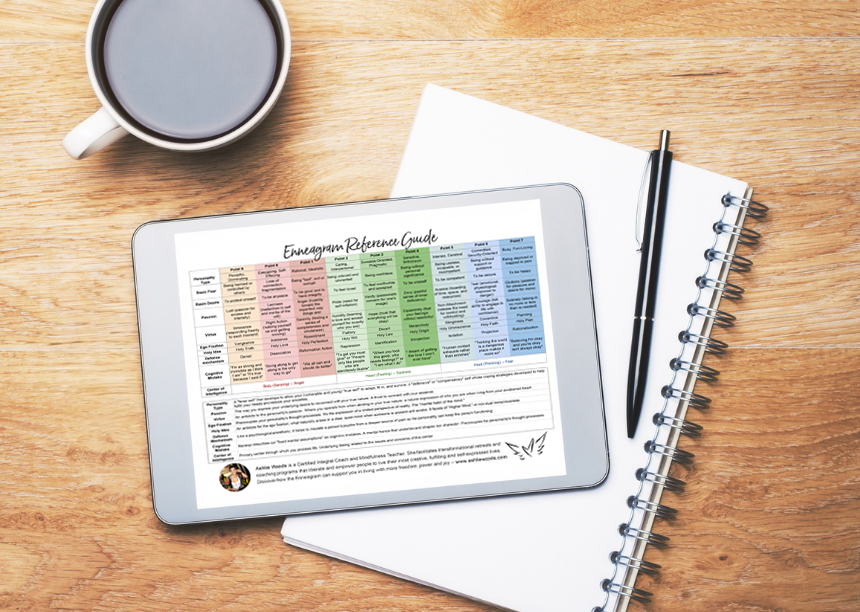Sexual Four — “Competition”
In the Sexual Four subtype, the inner motivation is envy, and its manifestation as competition. These Fours don't feel consciously envious so much as they feel competitive as a way of muting the pain associated with envy. If they can compete against another person they perceive as having more than they do and win, they can feel better about themselves.
Sexual Fours believe it's good to be the best. Most people want to present a good image to others, but Sexual Fours don't care very much about image management or being liked. For them, it's better to be superior. They are highly competitive, and their intense focus on competition takes the form of actively striving to show that they are the best.
This quick reference guide captures the various aspects of each Enneagram Type including attributes, basic fears, desires, passions, virtues, fixations, defense mechanisms, and more!
People with this subtype tend to have an “all or nothing” belief related to success: if success is not all theirs, they are left with nothing. This pattern leads to excesses related to their efforts to achieve success, and it also generates feelings of hate.
Sexual Fours are usually arrogant, despite having an underlying sense of inferiority. In the face of the pain of feeling misunderstood, an arrogant attitude is adopted as overcompensation- a means of being recognized. These Fours like being part of “chosen” group, and they can be very elitist. They may refuse to feel indebted to anyone, and they may have the sense that they have the exclusive right to feel offended by the lack of consideration of others. Any criticism or reproach is seen as an affront or disqualification.
Envious anger dominates the expression of this subtype's unconscious instinctual impulses. Sexual Fours' deeper instinctual motivation is about a refusal to suffer the pain brought about by envy, and a need to reduce suffering by projecting the responsibility for meeting their needs onto others and minimizing others' accomplishments in comparison with their own.
Sexual Fours “make others suffer” because they feel that they have been made to suffer and so need some sort of compensation. They may seek to hurt or punish others as an unconscious way of repudiating or minimizing their own pain. Naranjo observes that this tendency of this Four can be summed up by the phrase, “Hurt people hurt people.” Externalizing pain helps them ease their inner sense of inferiority. Their relationship to suffering can thus best be understood as a refusal to suffer. This gets expressed as an active insistence on their needs being validated and met. (They want with anger.) More shameless than shameful, Sexual Fours are vocal about expressing their needs; they rebel against any shame connected to their desires. This subtype follows the life philosophy that “the squeaky wheel gets the grease.”
When others experience Sexual Fours as demanding, this can lead to a pattern of rejection and anger: Sexual Fours get mad when others don't meet their needs, but their demanding nature causes people to avoid or reject them, and then they get angry about being rejected. This type can thus get trapped in a vicious cycle when rejection leads to protest and protest leads to rejection.
The Sexual Four is more assertive and angrier than the other subtypes. Naranjo refers to this Four as the “mad Four” as opposed to the “sad” (Social) Four. These Fours can be very outspoken with their anger because expression of anger is their way of defending against painful feelings. When they unconsciously turn their pain into anger, they don't have to feel their pain anymore.
These Fours may even seek to hurt or punish others as a way of repudiating or minimizing their underlying pain. They feel justified in pointing to others as the source of their deprivation or frustration, which serves as both a distraction from their own role in their suffering and a plea for help and understanding.
Naranjo says that this Four subtype can be the angriest personality among the Enneagram types. They may express envious anger as a way to establish or assert power when they feel inferior at a deeper level, which can be a way to manipulate situations to their advantage. (This kind of anger was the impulse between the French revolution: “I envy the rich, so I'll organize a revolution.”) And Sexual Fours can be very impulsive. They want things immediately and have little tolerance for frustration.
Naranjo calls this type “Competition,” and Ichazo called it “Hate.” While this type can be both hateful and competitive, it is important to remember that the competition and hate expressed by this Four represents a deeper need to project their sense of suffering and inadequacy outward. The painful sense of envy felt by the Sexual Four can motivate a wishing with anger, or a sense of “Ive got to get what I need, both to convince myself that my needs aren't shameful, and to feel better about myself with respect to others.” Their competitiveness and anger is a compensation for and a defense against the hurt they feel underneath.
These Fours like and need emotional intensity. Without intensity, everything can seem unbearably dull and boring. When Sexual Fours want somebody's love, they can be very direct about asking for what they need, or can become “extraordinary”- make themselves seem special and attractive and superior- in an effort to attract it. In line with their natural intensity (fueled by both their heart-based emotional temperament and their sexual instinct), these individuals tend to be more present and available in relationships because they don't deny or avoid many of the factors that can inhibit others relationally, like anger, neediness, competitiveness, arrogance, and having to be liked all the time. However, at times it may prove difficult for them to maintain a loving attitude because they confuse sweetness and benevolence with being false or insincere.
Sexual Fours are most likely to be confused with Type Eights or Sexual Twos. Like Eights, they have easier access to anger than most types, but they differ from Eights in the wider range of emotions they regularly feel. Naranjo points out that Eights often don't need to get angry, whereas this Four frequently feels misunderstood or envious, so they may show anger more often. They can also look like Sexual “Aggressive-Seductive” Twos (because both types can be aggressive and seductive in relationships) but the Sexual Two is more oriented toward pleasing others.
Roger, a Sexual Four, speaks:
"The all-too-cumbersome online tests often report I am an Eight or a Three, but I know full well that I am a Sexual Four. My greatest friend in the world, my Type Five elder sister, once leaned over at an Enneagram workshop and underlined the word “hostility” in a description of the Sexual Four with her finger and told me, “You need to work on that.” I had to listen to her feedback because she has known me my entire life and so must be a reliable reporter. Of course, I had a finger to offer her regarding the work I thought she might have yet to address in her own life.
Instead of feeling anything vulnerable in my personal life, I will often go to anger. Instead of experiencing myself as ordinary or less-than in my professional life, I will often go to competition, aggression, or even hostility. I don't relate to the descriptions of the over-sensitive, complaining (Social) Four: I go after my enemies or perceived adversaries who I feel threatened by directly rather than hanging out too long in discomfort. I also go after my objects of desire directly, and there are many. It may seem Threeish and Eightish that I need to be on top professional and personally. But although I pride myself on being direct and honest rather than nice, I know I am not an Eight because my Focus of Attention and my Achilles Heel is definitely Envy; it invigorates me to go after what I want (or take down the person who got what I didn't get). I know I am not a Three because I take more pride in being one-of-a-kind than in being successful. I own that I can come across as arrogant and even hostile if I feel threatened. This has not always served me well in either personal or professional relationships and this kind of response saddens me. Luckily, I have learned the value of staying with the softer feelings, experiencing my vulnerability, being with a great partner, and being one amongst many."
Specific Work For The Sexual Four on the Path from Vice to Virtue
Sexual fours can travel the path from envy to equanimity by strengthening their ability to be with their own suffering without needing to externalize it or project it onto others. If you are a Sexual Four, you can grow by seeing all your emotions as equally valuable and important, whether you are feeling envious and angry or sad and vulnerable. Your tender feelings are as important to consider as your competitive impulses. For you, equanimity means recognizing the value of who you are, even if you aren’t the best or superior to anyone else. No one has to prove themselves to be the best to be worthy- we are all inherently good enough. Allow yourself to see your anger, frustration, and impatience as important clues to deeper feelings of pain that you might be experiencing or relegating to unconsciousness. By allowing yourself to experience all your feelings and remembering they are all important reflections of the emotional truth of who you are, you can develop more compassion for yourself and others and allow yourself to be more open to receiving love and acceptance from the people around you.
Sourced with permission from The Complete Enneagram by Beatrice Chestnut.
Type 1 Type 2 Type 3 Type 4 Type 5 Type 6 Type 7 Type 8 Type 9
Ashlie Woods
Director of Business Division & Lead Coach at Sourced
Ashlie is a transformational coach, retreat leader, dance lover and Enneagram enthusiast. She is passionate about facilitating experiences that liberate and empower people to live their fullest, more creative and self-expressed lives. She believes there is a life that wants to be lived through you and a purpose only you can fulfill.
She spent 6 years designing and delivering corporate training programs focused on leadership development and company culture before making the bold leap to start her own retreat-based business.
Ashlie now supports heart-centered business owners (coaches, consultants, creatives, healers) to market, sell and deliver their transformational work in the world using their unique magical gifts.




